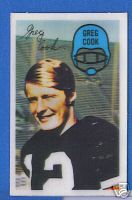
Even if you don't like the Bengals--and I don't--you had to feel a little sick to your stomach as you watched their franchise QB writhing in pain with what everyone instantly knew was a serious knee injury. But for Bengals fans, the injury was probably even more traumatic than it would be for fans of another team in a similar situation.
Why? Well, as Carson Palmer lay on the turf at Paul Brown Stadium yesterday, I guarantee you that thoughts of a young QB named Greg Cook passed through the minds of more than a few long-time Bengals fans. If you don't know his story, then listen up, because Greg Cook is one of the NFL's great "might have beens."
Greg Cook was drafted by the Cincinnati Bengals in the 1st round of the 1969 draft. He was a hometown kid who played his college ball at the University of Cincinnati, and many say he was the most naturally gifted QB they ever saw. They say he could throw the long ball like nobody before or since--reportedly throwing a touchdown pass to Bob Trumpy that covered 70 yards in the air.
Cook was the AFL's rookie of the year in 1969, and his 9.41 yards per passing attempt that year not only led the league, but remains the Bengals' longest-standing record. His performance becomes even more impressive when you consider that long-ball guys like Namath, Lamonica and Hadl were at the peak of their careers at that time, and that he did it despite missing three games and part of a fourth with the injury that would bring his career to an end.
Cook felt a pop in his shoulder in a game against Kansas City. The Bengals thought he simply dislocated the shoulder, and Cook took cortisone shots that allowed him to play after a few weeks. He actually had torn a rotator cuff, and the additional damage he did to his arm by playing with it effectively ended his career. He hung around for a few years, eventually retiring in 1973, but his career was basically over after 1969.
An interesting twist to this story is that Cook's injury led to the development of what became known as the West Coast Offense. The Bengals' offensive coordinator at the time was Bill Walsh, and when Cook went down, they traded for Virgil Carter. Carter was a small, smart and quick player, and as Walsh adapted their offense to meet his skills, the deep pass was deemphasized, and the ball control passing game that characterizes the West Coast Offense was born.
So, spare a thought for the Bungles fans today. Sometimes we think that Cleveland fans have a monopoly on heartbreak, but it's hard to find a story to top Cook's. I said hard, but not impossible, at least for America's Sports Misery Capital: We'll see your Greg Cook with our Herb Score, and raise you Ernie Davis.
Click here for an interesting article about all this from Sport's Illustrated's Paul "Dr. Z" Zimmerman.
Monday, January 09, 2006
The Cincinnati Bengals and the Ghost of Greg Cook
Posted by
Hornless Rhino
at
7:44 AM
![]()
Subscribe to:
Post Comments (Atom)
No comments:
Post a Comment